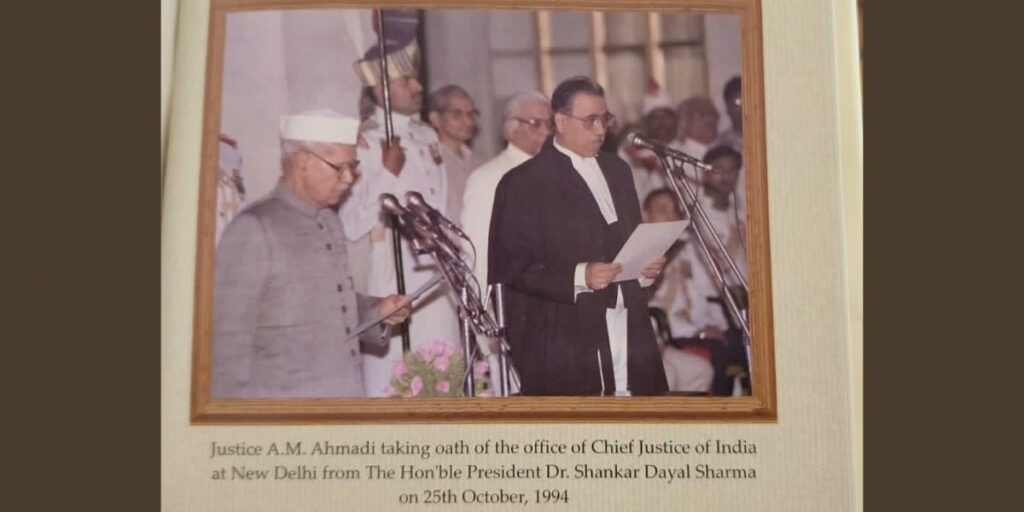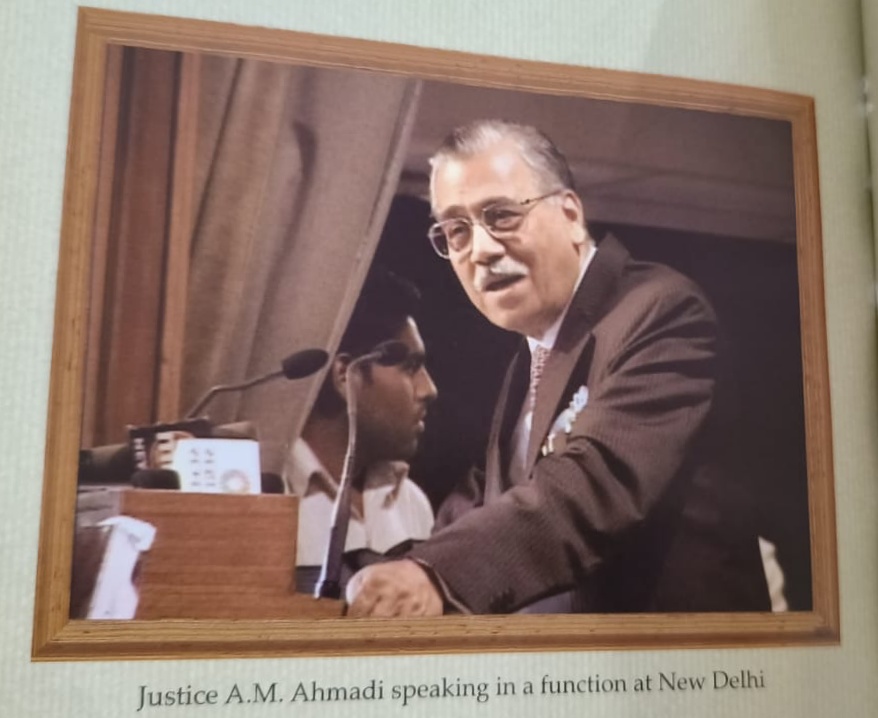Surat, GUJARAT / NEW DELHI :
Justice Ahmadi showed his courage and conviction in upholding the constitutional culture in our diverse system and ensured that the spirit of diversity in the Constitution is not nullified.

Justice A.M. Ahmadi was born in Surat, Gujarat in the year 1932 and passed away on Thursday at 5 am in New Delhi at the age of 91 years. He had an exceptional career, handling the judicial process at all three levels of the judiciary apart from being the chief justice of India for about three years, out of his total term as judge in the Supreme Court for about nine years. I started my practice in the year 2000 but he had already demitted office in 1997, so I had no occasion to see him as a judge. However, in the limited interactions with him and after reading his judgments and lectures, I wanted to write a few lines about him.
As a judge of the Supreme Court of India, he was part of many constitution bench judgments, starting from a five-judge constitution bench judgment in Charan Lal Sahu v Union of India (1989) relating to the constitutional validity of legislation regarding claims of victims of the Bhopal gas leak disaster. In that case, the three-judge majority opinion was written by Justice Mukherjee, while Justice Ahmadi agreed with a partly dissenting opinion written by Justice Ranganathan saying that the old antiquated Act should be drastically amended or freshly enacted, and should contain appropriate provision for the payment of fixed minimum compensation on “no fault liability” during the pending adjudication of the claims by a prescribed forum.
In another Bhopal gas leak case (1991), Union Carbide v. Union of India, Justice Ahmadi along with Justice R. Mishra held that there is no power in court to confer immunity for criminal prosecution and punishment; such immunity may amount to preferential treatment violative of the equality clause. They further stated that the citizen is entitled to be under the rule of the law and not the rule of discretion.
He was also part of a five-judge bench in the Cauvery basin water dispute, where the Ordinance of 1991 by the Karnataka government was held to be beyond the legislative competence of the state and therefore held to be ultra vires.
In the Mandal reservation judgment, he was the part of the majority judgment of the nine-judge bench written by Justice B.P. Jeevan Reddy (for three other judges) which was further concurred by separate opinions of two more judges. In another nine-judge bench, which created the Collegium system (the 2nd judges case) for the appointment of judges, he disagreed with the majority judgment, while giving a different interpretation of Articles 124 and 217 of the Constitution of India. However, he still held that the degree of judicial independence is near total after a person is appointed and inducted into the judicial family, and on the administrative side the chief justice of India enjoys limited primacy with regard to managing the court business. At the same time, the president, i.e. the executive, does not enjoy the right of veto in the same sense that the president is not bound to act according to his views. He held that graded weight has to be attached to the views of the chief justice of India.

On the other issue, relating to exclusion of powers of the high court in relation to Articles 226/227 of the Constitution of India, while heading a seven-judge bench, Justice Ahmadi struck down certain provisions of the Constitution of India introduced through amendment by stating that though power of amending the Constitution is with the Parliament, it cannot be exercised so as to damage the basic features of the Constitution or to destroy its basic structure.
We can also not forget Justice Ahmadi’s concurring view to the majority judgment in the S.R. Bommai case, where he commented on secularism under the Constitution. He stated that India is a country with a rich heritage. Several races have converged in this sub-continent. Consequently, these diversities have thrown up their own problems but the early leadership had showed wisdom and sanctity in tackling them by preaching the philosophy of accommodation and tolerance.
In 1993, the Union government acquired land measuring about 67 acres in Ayodhya, which included the land where the Babri Masjid existed before its demolition in 1992. The Acquisition of Certain Area of Ayodhya Act also declared the abatement of the all the pending legal proceedings. The majority view of the three Judges authored by Justice J.S. Verma upheld the Act in part and held that the acquisition was valid. Justice Ahmadi dissented with the majority view, and agreed with the dissenting opinion written by Justice S.P. Bharucha setting aside the Act in totality. While setting aside the Act, the dissenting opinion noted that “Ayodhya is a storm that will pass. The dignity and honour of the Supreme Court cannot be compromised because of it.”
In my view, the majority opinion was a balancing act by the Supreme Court which paved the way for further judicial proceedings, culminating into a final unanimous verdict of the constitution bench in 2019 completely ousting the Masjid from the place where it stood for a period of more than 400 years.
After demitting office as a judge of the Supreme Court, Justice Ahmadi was the chief trustee of the Bhopal Memorial Hospital Trust for a period of over 10 years, which was essentially meant for the victims of the gas tragedy. During his tenure, the hospital was very effectively administered and rendered true public service. He was chancellor of Aligarh Muslim University. He conducted arbitrations and delivered lectures on various public fora.
Justice Ahmadi showed his courage and conviction in upholding the constitutional culture in our diverse system and ensured that the spirit of diversity in the Constitution is not nullified by giving certain interpretations which go against the spirit of the Constitution itself. As a judge, he showed judicial statesmanship and took a strong position to uphold the sanctity of the Constitution. He will be remembered amongst those judges who were strong and did not succumb to the will of the executive.
As an academic and a citizen of India, he opposed hate speech, imposition of one culture over the other and arbitrary police power, and propagated unity in diversity and appealed to citizens to treat every denomination as a part of the larger society rather than trying to marginalise certain groups. His wife passed away in August 2022, he has joined her within six months. His son, senior counsel Huzefa Ahmadi, and daughter, advocate Tasneem Ahmadi, will carry forward his legacy.
M.R. Shamshad is an advocate, Supreme Court of India.
Edited by Jahnavi Sen.
source: http://www.thewire.in / The Wire / Home> Opinion> Law / by M R Shamshad / March 03rd, 2023








